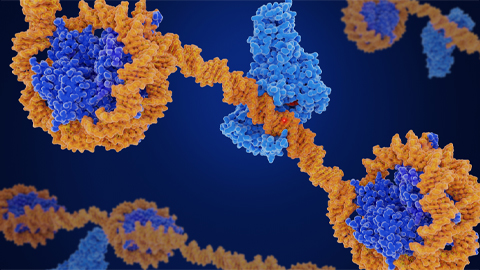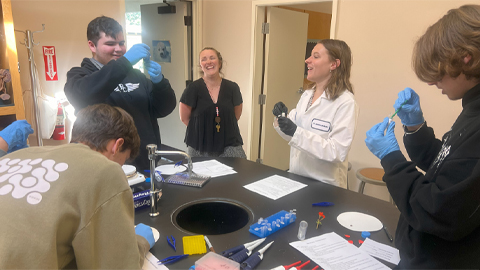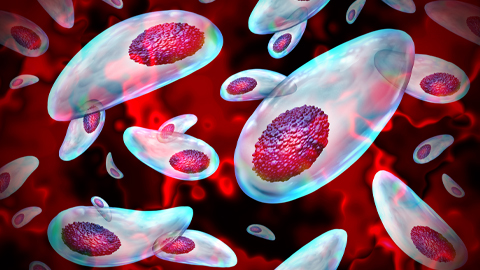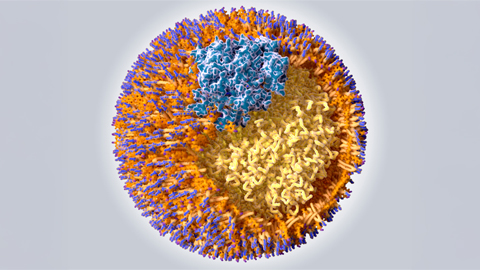
What does biochemistry have to do with climate change?
Ask Karla Neugebauer about her journey to climate activism, and she highlights two moments.
The first was in 2006. She was on vacation in Australia’s Northern Territory with her family, camping in the outback not far from Alice Springs. That part of Australia, known to some as the Red Centre, is beautiful, severe desert country — the kind of place where it’s unwise to start a road trip without a five-gallon water tank and a spare tire. The rocks are russet. In the deep shade of narrow gullies in the MacDonnell mountain range, small pools of water cool the air around them, making small miracles of oasis.

in the Australian outback and a dinner conversation with her son.
Neugebauer read aloud on the road trip, as she often did when her children were young. She came to an article by paleontologist turned climate writer and activist Tim Flannery outlining the fiery future Australia faced if it maintained its inaction on climate change.
“Being immersed in the natural environment and then reading this thing was just kind of devastating,” Neugebauer said. “I remember sitting in the back seat and just bawling.”
At the time, she was a group leader at the Max Planck Institute of Molecular Cell Biology and Genetics in Germany. There was no clear link between her professional expertise, which concerns RNA splicing and gene expression, and the looming crisis.
More than decade later, she sat down to dinner with her son and a friend he had grown up with. The world had continued to careen down the path of escalating emissions and rising global temperatures Flannery had described. Neugebauer had moved to the U.S. by this time and had taken a faculty position at Yale, but her son, a young adult, had returned to Dresden for an internship. He and his friend had become involved in the Fridays for Future climate protests; sometimes, their friends had been arrested. If they did choose to go to college, both young men said, the only fields worth studying would be environmental engineering or politics — disciplines that could save the planet.
Their deep concern for the future galvanized her to act — and made her wonder why other areas of expertise did not also seem like productive tools for climate activists. “It disappointed me that other disciplines didn’t come to their minds,” Neugebauer said.
The more closely she looked at biochemistry, the less she could blame young people for overlooking its relevance. When she canvassed other universities for ideas about how to teach the biology of climate science, she came up emptyhanded. At interdepartmental meetings she began to attend virtually a few years later, during the pandemic, she was the only biochemist in attendance.
Neugebauer argues that the field has become myopically focused on human health because of funding organized around diseases of individual organs. Even basic researchers must think and write in terms of curing disease to secure grants.
“I submit to you the work I’m doing on stress in HeLa cells is relevant to climate change — because I’m studying how gene expression changes to parameters that are going to change for the algae and the fish,” Neugebauer said. Yet when she talks to her neighbors about her work, she hears herself describing applications in cancer. “I’m not curing cancer! I’m a basic scientist. I’m asking fundamental questions that I believe are terribly important for allof these reasons.”
She illustrated that belief by launching an unconventional seminar in the fall of 2021. The course, called Biochemistry and our Changing Climate, explores the basic biochemistry that governs living systems’ response to a changing world.
Neugebauer guides her students through discussions of articles that illuminate the core concepts of biochemistry in a climate context. She talks about the aromatic amino acid synthesis pathways that the pesticide Roundup inhibits and about how cell biological responses to heat stress contribute to coral bleaching. She talks about nitrogen fixation — a biochemical process that her department’s core courses do not cover. She talks about engineering enzymes that could recycle plastics or entomb atmospheric carbon in building materials.

“People have a hard time understanding what I mean by a class about biochemistry and climate change,” she said. The course isn’t focused on ecology or on bioengineering. Instead, she seeks to explore on a molecular level the mechanisms by which climate change is affecting and will alter further the living world. It frustrates her when students ask questions that biochemistry clearly could answer — for example, What molecule from red algae reduces cows’ methane emissions? — but has not.
She aims to show her students that biochemists have a role to play in understanding climate change and a role to play in adapting to and mitigating the crisis.
Neugebauer has spent time recently visiting other departments to tell them about her course. By the time you receive this magazine, she will be immersed in teaching it for a second time. “I’m on a mission to make people aware of this,” she said.
See us at #DiscoverBMB
Karla Neugebauer and Henry Jakubowski (author of the climate change article “How to be a climate activist”) will host an interest group on “Biochemistry and Climate Change” on March 25 at Discover BMB 2023, the ASBMB annual meeting in Seattle.
Enjoy reading ASBMB Today?
Become a member to receive the print edition four times a year and the digital edition monthly.
Learn moreGet the latest from ASBMB Today
Enter your email address, and we’ll send you a weekly email with recent articles, interviews and more.
Latest in Science
Science highlights or most popular articles

CRISPR epigenome editor offers potential gene therapies
Scientists from the University of California, Berkeley, created a system to modify the methylation patterns in neurons. They presented their findings at ASBMB 2025.

Finding a symphony among complex molecules
MOSAIC scholar Stanna Dorn uses total synthesis to recreate rare bacterial natural products with potential therapeutic applications.

E-cigarettes drive irreversible lung damage via free radicals
E-cigarettes are often thought to be safer because they lack many of the carcinogens found in tobacco cigarettes. However, scientists recently found that exposure to e-cigarette vapor can cause severe, irreversible lung damage.

Using DNA barcodes to capture local biodiversity
Undergraduate at the University of California, Santa Barbara, leads citizen science initiative to engage the public in DNA barcoding to catalog local biodiversity, fostering community involvement in science.

Targeting Toxoplasma parasites and their protein accomplices
Researchers identify that a Toxoplasma gondii enzyme drives parasite's survival. Read more about this recent study from the Journal of Lipid Research.

Scavenger protein receptor aids the transport of lipoproteins
Scientists elucidated how two major splice variants of scavenger receptors affect cellular localization in endothelial cells. Read more about this recent study from the Journal of Lipid Research.

